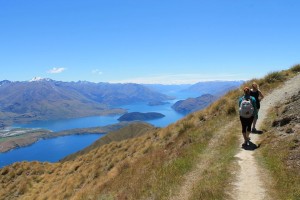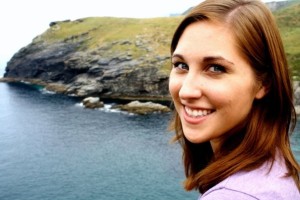Standing at the peak, the wind whipping my hair across my cheeks, I close my eyes and tilt my face to the sun. I stretch out my arms and turn up my palms and breathe. I open my eyes and try to absorb the techni-colored panorama of jagged, white mountain peaks, emerald pastures and shimmering diamond lakes reflecting back the exact impossible blue of the New Zealand sky and I think, Heaven looks like this.
I sit on the back of a scooter, hands gripping the waist of the twelve-year-old boy who is my driver as we zip down the jungle roads to a breakfast of green leaf pancakes with palm sugar. We dodge a rooster strutting cockily across the road and I can’t stop smiling from ear to ear because heaven feels like the wind blowing past my face as we bump over potholes, winding our way through the Balinese jungle.
In Canterbury Cathedral I kneel, dappled by colored light from the stained glass windows and thinking about Augustine and about Thomas Becket, crouching on these very stones, heart pounding as he waits, pleading with God to spare his life. I inhale and imagine Becket in heaven, smelling the aroma of this same sweet incense in the throne room of the Most High God.
On a mountain in Peru a whole village of Quechuan people, dressed in layers of wool in all the colors of the rainbow, sing a song about their beloved mountain, Huascaran. They sing in high-pitched nasal tones a song that sounds like some combination of zydeco and a tribal wail. The sound is harsh and grating to my ears and yet I can’t help thinking that this is what heaven sounds like – a great cacophony of sound.
In an old Communist youth camp beside the mighty Volga River hours north of Moscow, I tuck a room full of 9-year-old orphan boys into bed. I hug Dema’s freckly face to my chest and kiss the top of his head and think, The kingdom of heaven belongs to such as these. “Spokie-Nokie,” I say, and turn out the light.
* * * * *
Once, a few years into our marriage, my husband and I had an argument about travel. We had hoped to take a trip, but car problems and taxes and medical bills had strained our very limited resources. It seemed like a trip was out of the question and I was profoundly disappointed. At some point during the conversation Jonathan said to me, “I know you’re disappointed, but there will be other opportunities in the future. I don’t understand why you are so incredibly upset.”
And I said (as dramatically as it sounds), “Because this is the purpose of my life!”
And he said, “You can’t be serious. You basically just told me your life’s purpose is to take vacations.”
What I couldn’t articulate in that moment was that traveling is a deeply spiritual experience for me. Traveling moves me to worship in a way that nothing else does.
What does it mean that the mountains melt like wax in the presence of the Lord until you’ve stood at the top of a great and glorious mountain?
What does it mean that all of man’s accomplishments are like filthy rags beside God’s splendor until you’ve seen the Sistine Chapel or stood on the Great Wall of China?
Why does it matter that God is a father to the fatherless if you’ve never known the orphan?
How can you understand what it means that God holds the whole world in the span of his hand if you’ve never been outside your hometown?
What does it mean that heaven is filled with people from every tribe and tongue and nation if you’ve only known people from your own?
“The whole earth is filled with His glory,” cry the angels. I want my life to be about seeing and spreading that glory, even to the ends of the Earth.

* * * * *
 Author Bio: “In Defense of Wanderlust” was written by Lily Ellyn Dunn. Lily was born and raised in South Louisiana, went to college in Illinois, started working in North Carolina, and currently lives with her husband in South Korea where she is a teacher by day, a writer by night, and an ice cream connoisseur all the time. Lily blogs about life, faith, and everyday grace at http://lilyellyn.com. Find her on Twitter @lilyellyn
Author Bio: “In Defense of Wanderlust” was written by Lily Ellyn Dunn. Lily was born and raised in South Louisiana, went to college in Illinois, started working in North Carolina, and currently lives with her husband in South Korea where she is a teacher by day, a writer by night, and an ice cream connoisseur all the time. Lily blogs about life, faith, and everyday grace at http://lilyellyn.com. Find her on Twitter @lilyellyn
New Zealand photo credit to Jonathan Dunn